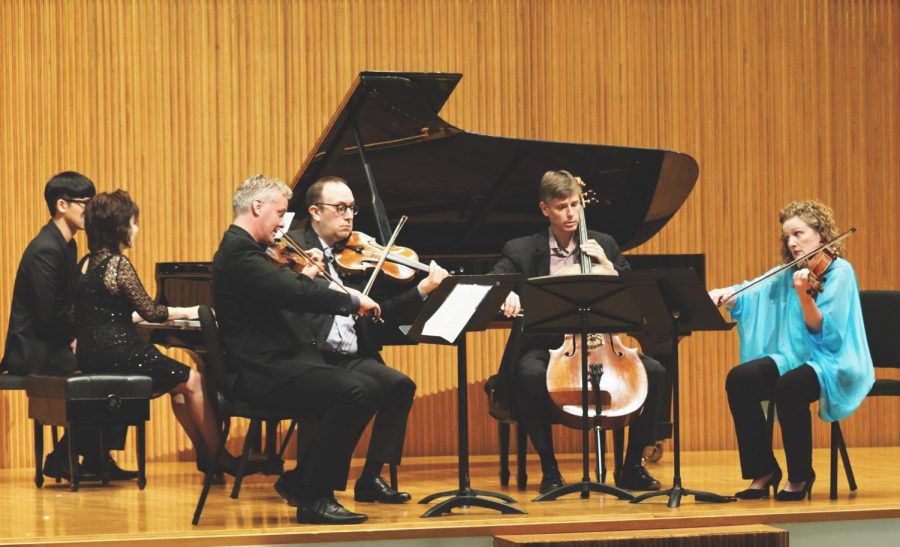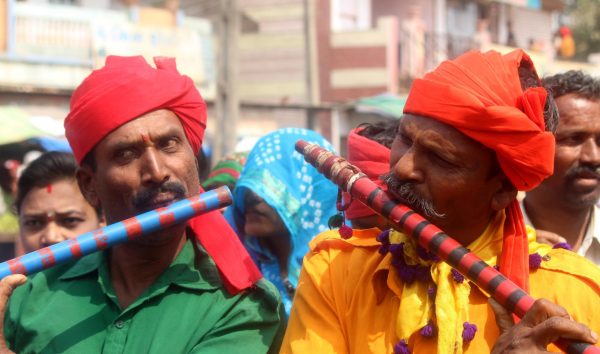Upcoming Festival Features Concerts and Panels on Mortality
Photo courtesy of Oberlin Conservatory
Conservatory faculty rehearse for this weekend’s “End of Life, End of Time” festival performances.
This weekend will be an exciting one, featuring music, discussions, poetry, and art — all centered, surprisingly, around mortality. On Saturday, Sept. 7 and Sunday, Sept. 8, the Conservatory will host the “End of Life, End of Time” festival. The festival was created by Professor of Violin Sibbi Bernhardsson, OC ’95, who became fascinated by pieces written late in composers’ careers.
“The subject of art created at the end of the artists’ life is a compelling one,” Bernhardsson wrote in an email to the Review. “Oftentimes composers start writing chamber music at the end as their subjects become more intimate, personal and experimental. I wanted to explore that topic as well as the question of how artists in general think about the end of time.”
The name for the festival came from French composer Olivier Messiaen’s “Quartet For the End of Time,” which premiered in a German prisoner-of-war camp during World War II. Faculty discussed performing the piece at Oberlin, but Bernhardsson felt that “the subject matter was so serious and the music so powerful that we should build a festival around it.”
The festival will span the weekend, featuring faculty panels, readings, and concerts at Warner Concert Hall, the Allen Memorial Art Museum, and the David H. Stull Recital Hall. The events will feature 18 performers, 15 speakers from across campus, the Oberlin choir, and a string orchestra.
Bernhardsson is grateful that Oberlin has the resources to take on such a big project.
“I love the fact that we have here at Oberlin all the musical and intellectual resources right at our fingertips,” he said. “We are able to pull experts from the departments of Geology, Classics, Creative Writing, English, Psychology, from all corners of the Conservatory and from our great museum to create a very rich and compelling weekend festival.”
The festival will kick off with a free gallery talk on French painter Claude Monet’s “Wisteria”, acquired by the Allen Memorial Art Museum in 1960, along with some of Monet’s other late-career works. Then, the first faculty concert will begin on Saturday at 1:30 p.m., featuring works by Beethoven, Fauré, Purcell, and Schubert, and poetry read by Associate Professor of English DeSales Harrison. Be sure to come in early for a talk with Professor of Musicology Charles McGuire, which will be followed by a panel at 3:30 p.m. in David H. Stull Recital Hall. The second faculty concert of the day will be at 7:00 p.m., with music by Beethoven, Haydn, and Messiaen, and poems read by Assistant Professor of Creative Writing Chanda Feldman. Andrew Shenton, a musicologist from Boston University, will deliver this event’s pre-performance lecture.
Sunday follows the same concert-panel-concert structure, with two times and locations. The 1:30 p.m. faculty concert will showcase pieces by Shostakovich, Boulanger, Debussy, and Brahms, poems read by Feldman, and a pre-show talk with Associate Professor of Music Theory Andrew Pau. The second concert at 7:30 p.m., following the 3:30 p.m. panel at Stull Recital Hall, will open with a talk by Professor of Music Theory Brian Alegant and feature music by Prokofiev, Brahms, Schumann, and Beethoven, and poetry read by both Harrison and Feldman.
The two panels, “Musicological, Geological, and Classical Perspectives on The End of Time” and “Us at the End: Hearts, Minds, and Souls,” will feature guest speakers, College professors, and community members. Rabbi Megan Doherty, director of Oberlin College Hillel and moderator of “Us at the End,” explained that her panel “will be discussing how each of our faith traditions and/or areas of expertise respond to death and the process of dying.”
Associate Professor of Psychology Paul Thibodeau, who is speaking at “Us at the End,” further explained the content of his speech.
“The psychological science of end of life issues is a really new area of research, and there are so many interesting and unanswered questions,” Thibodeau wrote in an email to the Review. “One of the issues I’ll talk about is whether there is empirical support for this theoretical model [for the psychological perspective] — how it can be helpful and how it can be misleading.”
While there is no “correct” way to view death, Professor Thibodeau hopes attendees “have the experience to reflect on an important universal human experience with the blend of artistic, spiritual, and intellectual components of the event.”
Christopher Trinacty, associate professor of classics, is speaking at the “Musicological, Geological and Classical Perspectives on The End of Time” panel. He will be speaking about cyclical time and Roman thought, including eternal recurrence. This concept claims that all energy in the universe has been recurring and will continue to do so.
“I see this as [a] perfect example of the sort of interdisciplinary thinking/events that Oberlin excels in offering,” Trinacty wrote in an email to the Review.
“It is important to know this perspective because of ways that it can help inform our belief about the end of our own lives, the end of the world, and the proper perspective one should have about the end,” he added.
“End of Life, End of Time” will run this Saturday and Sunday. The festival is open to the public and free of charge.











